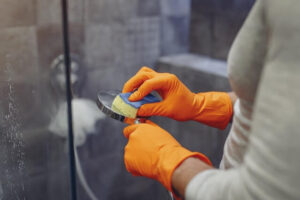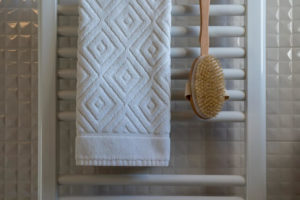If you notice your water softener leaking, you don’t need to panic, but you should fix it as soon as possible. In this article, I talk about some of the most common scenarios as well as some solutions that you can try on your own before contacting a plumber. Important note: before trying to figure out where the water is coming from, disconnect the water softener’s power supply. Always remember, safety first! Scenario #1: Rotor Valve The rotor valve on your water softener is usually located at the top of the unit. As the source of water into the water softener, the rotor valve is often the source of leaks. Over time, it can develop cracks and need to be replaced. If you do not notice any cracks or breakage around the rotor valve but you can see water coming from it, the problem could be the seal located on the inside of the valve. In either case, you will need to contact a professional plumber to fix the issue. Scenario #2: Punctured Brine Tank The brine tank is where you place the salt. In case you didn’t know, water softeners work by replacing calcium and magnesium ions in your … Continue reading Why Is My Water Softener Leaking? Solutions for Some Common Scenarios

How to Find a Water Leak Inside a Wall: 5 Steps to Take ASAP to Prevent More Damage
Want to protect your home from water damage? In this article, we discuss how to find a water leak inside a wall so you can prevent a costly repair. When leaks go undetected for a long time, they can cause substantial damage to your home and your belongings. From crumbling drywall and bubbling paint, to rotting flooring, to mold infestation, the problems that come with a leak inside the walls of your home can have serious, lasting consequences. To discover and pinpoint a leak, follow these steps: Know the Signs of a Water Leak Inside a Wall To locate and fix a leak inside your walls, you must first know that there is a leak to fix. Obvious signs of a leaking pipe located in the wall include standing water or wet carpeting near a wall and discoloration on the wall itself. When excessive amounts of water accumulate within your walls, you may also notice a change in the wall’s texture. It may look like the paint or wallpaper on your drywall is bubbling or bulging. If your wall appears to bulge outward, that could be a sign of a major leak that needs to be addressed ASAP. As … Continue reading How to Find a Water Leak Inside a Wall: 5 Steps to Take ASAP to Prevent More Damage

Hard Water Treatment: 5 Reasons to Install a Water Softening System
Thinking of adding a hard water treatment system to your plumbing? Get more information about why you should in this article. You have scrubbed the deposits from your sink, felt the residue on your skin, replaced your shower head more times than you can remember—maybe it’s time to install a water softener. If you are tired of dealing with the effects of hard water, this solution is pretty easy to put into action. Here are five reasons why you should stop putting it off. 5 Reasons to Install Hard Water Treatment Scale Deposits A clean home is a happy home, but hard water makes cleaning surfaces a pain. When the water on your shower door or in your kitchen sink evaporates, you’re left with a chalky substance—usually a mixture of calcium and magnesium. It is relatively easy to remove, but if you let even days pass between cleanings, your pristine home won’t look so pristine anymore. Hard water treatment can keep your home looking cleaner for longer. Dull Laundry Remember those laundry detergent commercials you watched on TV as a kid? Remember how bright and vibrant the clothes were after they were washed? Many people wonder why their clothing doesn’t … Continue reading Hard Water Treatment: 5 Reasons to Install a Water Softening System

Why Is Water Quality Important? It’s about Health and Safety
Why is water quality important? Your home’s water has a direct impact on your family’s health. Is it doing more harm than good? Here’s what you need to know about your water quality. We don’t often think about water quality in our homes, at least, not in terms of health and safety. Most of us in the United States do not have to worry about it. Unfortunately, however, in some cases, we should be worried about it. What if you found out that your water contained microorganisms, heavy metals, or minerals that could make your family sick? Your home’s water quality is an integral part of your family’s life. Your loved ones use it to cook and clean. They drink it straight from the tap to stay hydrated. Here are some common problems that affect water quality, a few health risks from bad water, how to fix the problem before it gets serious. Common Problems That Affect Water Some of the most common water quality problems that affect homeowners include: Hard water High acidity Contamination Hard water does not cause health issues, but it can cause serious damage to your home’s plumbing. The minerals that make the water “hard” can … Continue reading Why Is Water Quality Important? It’s about Health and Safety

Do I Need a Water Softener? How to Tell Whether Your Arizona Home Needs One
Have you ever wondered do I need a water softener? If so, this article is for you. Hard water is a common menace to many homes’ plumbing in Arizona. The only solution to this problem is to install a water softener. But how do you know if you need a water softener? It can be difficult to tell, but if you notice either of these signs, you can bet that you need to counteract a hard water problem. You Notice Limescale Buildup What do we mean by hard water? What makes water “hard”? It’s the minerals that the water running through your home contains. Two minerals that create hard water are calcium and magnesium. When these minerals come into contact with a hard surface, they often get left behind as deposits. While it can be a slow process, over time these deposits build up into what is known as limescale. Limescale is not only unappealing to look at, it can also cause damage you your pipes and fixtures that gets more difficult to fix over time. If you notice a white substance on any surfaces that frequently come into contact with your tap water, such as sinks and faucets, you … Continue reading Do I Need a Water Softener? How to Tell Whether Your Arizona Home Needs One

